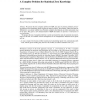26 search results - page 4 / 6 » An epistemic characterization of zero knowledge |
ECCC
2000
13 years 7 months ago
2000
Abstract. We present the first complete problem for SZK, the class of promise problems possessing statistical zero-knowledge proofs (against an honest verifier). The problem, calle...
SP
2008
IEEE
13 years 5 months ago
2008
IEEE
e an abstraction of zero-knowledge protocols that is le to a fully mechanized analysis. The abstraction is formalized within the applied pi-calculus using a novel equational theor...
ICALP
2007
Springer
13 years 9 months ago
2007
Springer
Adaptive security, while more realistic as an adversarial model, is typically much harder to achieve compared to static security in cryptographic protocol design. Universal composi...
JELIA
2010
Springer
13 years 5 months ago
2010
Springer
Stable belief sets were introduced by R. Stalnaker in the early ’80s, as a formal representation of the epistemic state for an ideal introspective agent. This notion motivated M...
SYNTHESE
2008
13 years 7 months ago
2008
Dynamic Epistemic Logic (DEL) is the study of how to reason about knowledge, belief, and communication. This paper studies the relative expressivity of certain fragments of the DE...

